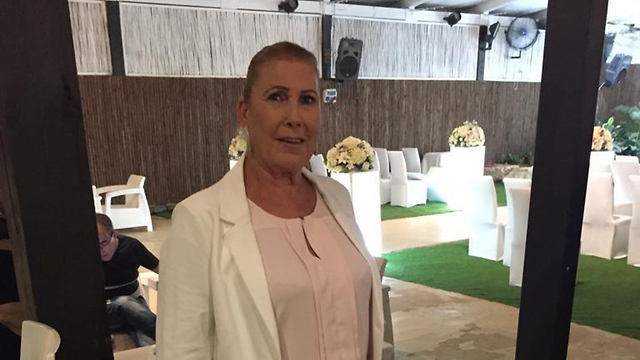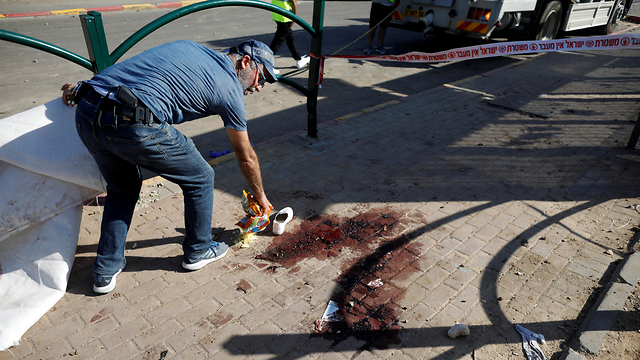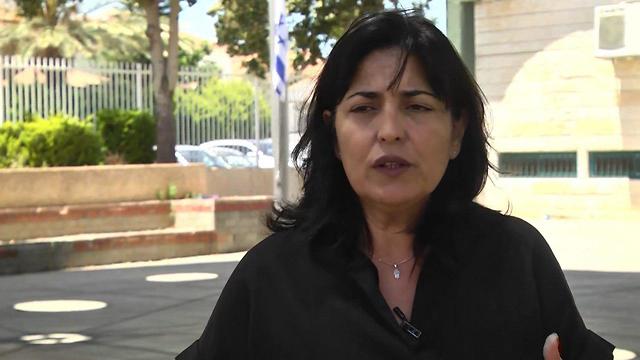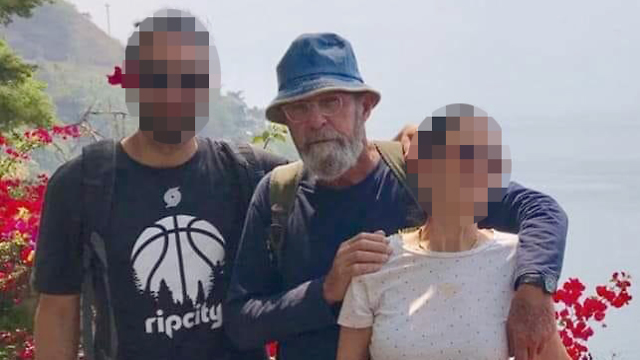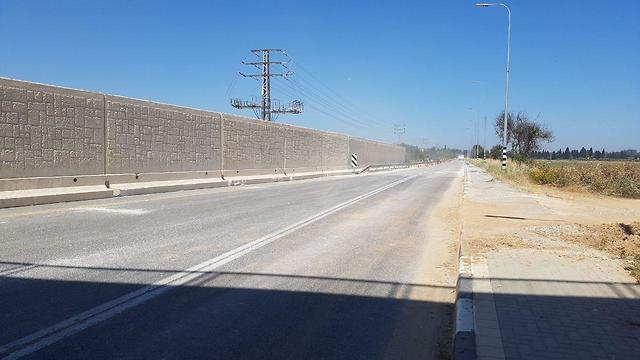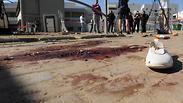

Picking up the pieces in rocket-battered southern Israel
'Everyone visited and then forgot we exist,' says son of 80-year-old woman critically hurt in rocket strike; children in Gaza border communities struggle to overcome their fear, while residents of kibbutz near Strip deal with realization of how vulnerable they really are
A week after some 700 rockets and mortars struck towns and cities in Israel's south - in the deadliest attack by Hamas and the Islamic Jihad since the 2014 war between Israel and Gaza, residents of those communities are trying to deal with the impact.
One of the most devastating blows appears to be the anti-tank missile attack that killed 68-year-old Moshe Feder as he drove to work along a road close to the Gaza border.
The residents of the southern city of Kiryat Gat, sympathetic to the Gaza border residents, were sure that they would be spared from the latest round of escalation. To their dismay, a rocket attack critically injured an 80-year-old resident of the city, Alegria Ben-Naqan.
Her son Arik, who lives close to his mother, says he and his family were left to deal with the harsh reality of the attack when the media spotlight faded.
"It was a mad house," he says, recalling the first days at Barzilai Medical Center in Ashkelon, where his mother is still being treated.
"Everyone came to visit. Knesset members, Deputy Health Minister Yaakov Litzman, the son of Chief Rabbi David Lau. For two or three days, it was total mayhem in the ICU and then nothing. They all forgot we exist."
He added: "Aside when from the hospital itself was hit by rocket fire, we have been taking shifts at our mother's bedside. There is nothing to done - life goes on and so does the country. Our lives on the other hand came to a halt the day the rocket hit. We have to treat the injuries and be with our mother through her recovery."
Arik talks of an active woman full of life, who refused to believe that something like this could happen to her.
"My mother never thought about it," he says. "Whenever the air raid siren went off she would go into the stairwell and wait for two minutes. Afterwards we would call to make sure she was okay. She would answer, `don't worry, everything is okay I don’t need anyone`. But then it caught up with her in a terrible way."
He says that physicians in the trauma room call his mother's case "miraculous," for had the shrapnel struck her body a centimeter in any direction she would not have survived.
Now she is afraid of being unable to speak, because her jaw and palate are damaged. He says that while there is no use in being angry, he is disappointed that people have so quickly moved on, as if no one was hurt in the violence.
Since the attack, Alegria's family members make sure that she is not alone even for one moment. In her home, everything is exactly in place. The fridge is stocked ready for her children and the grandchildren - even the cookies she baked are still on the table. The place where she was hit is roughly a three-minute drive from her home.
Arik says she had nowhere to hide as she walked in the street when the siren sounded.
"She came from there," he says, pointing to his brother's house. The crater made by the impact of the rocket has been covered over, but a nearby building is completely covered by shrapnel marks. A nearby school was also hit, but which was empty as it was a Saturday.
"It's difficult," Arik says. "I have been through wars and I have seen things, but when it hits you, that this is my mother, I don't know if that ever passes."
Scared children
Not far from the site of the rocket strike is Menachem Begin Elementary School. Everything seems to have returned to a normal routine, but the pupils and staff are more than aware of the complex situation they had to deal with, both during and after the latest round of violence.
Mori Azoulay, a sixth grader at the school, says that unlike children his age who live near the Gaza border, this situation is new to him.
He stayed in the shelter for three days during the latest round of rocket fire.
"There were a lot of air raid sirens and I'm not used to that," he says. "This was the only time I was in the shelter for so long. I slept there for three nights."
Mori says he feels safe due to the security measures in place, but appreciates that not everyone is the same.
"There is a shelter and an army protecting me," he says. "I always felt safe at home, at school and everywhere in the country. Some of my friends kept calm, but everyone takes the situation differently."
Despite the violence, the young student refuses to give up hope that peace will come one day. "Violence is not the answer," he says. "Peace will bridge the gap between us all."
Mori's school principal, Miriam Kisos, says that they were well-prepared for the deterioration in the security situation, but that they are still dealing with the fallout of the rocket attacks.
"When returning to school, we first had to take into account the resilience of our teachers and then that of our pupils. Some said that didn't shower for two days, which is something they weren't used to; some had no shelter in their homes and went into the staircase, and noticed that their parents were afraid as well," she says.
"Some of the children were referred to the school counselor, who has had her hands full in the past week, after their homeroom teachers noticed their distress."
Kisos says that her school has had support from the Education Ministry, but now most efforts are focused on returning to routine.
"We got a lot of requests from pupils and their parents," she says. "We saw children staying close to an adult during recess. Will there be another round? I hope not."
'No sense of security'
The entrance to Kibbutz Erez was the scene one of the worst incidents in the latest escalation, when an anti-tank missile fired from nearby Gaza killed Moshe Feder, who worked at one of the community's factories.
The incident showed the kibbutz residents how vulnerable they are at every moment, and not only to rocket and mortar fire. A week after the latest round, the IDF built a 700-meter tall cement barrier between the main road leading to the Kibbutz and the Gaza border fence.
The barrier is meant to absorb any further anti-tank fire, but for the residents it only emphasizes the true danger they face whenever the situation in Gaza escalates.
"We always knew we were vulnerable to rocket fire, but the incident at the entrance to the kibbutz made it a reality," says a kibbutz resident. "The incident only led us to realize we could be targeted in every way," she says.
"When I see the barrier being built along the entrance I'm disheartened. If a missile hits the wall how will it help? And if a missile hits the train passing on the bridge above? Our sense of security does not exist."
Dean, another kibbutz resident says: "This was a truly frightening incident. This is our reality here. I believe that this wall can stop the next missile, but it's difficult to live like this. The children are not comfortable with the situation. We intend on staying in the kibbutz and raising our children here despite everything. We will overcome it all."
This weekend, a senior IDF officer visited the kibbutz, promising the residents that several defensive measures would be taken in the coming days to deter further anti-tank missile fire on the area.
"I came out disturbed by the conversation, due to the situation," says one local resident. "While I completely trust that the army is doing everything to protect us, the situation is much more complex. Unfortunately, I see the next escalation round just around the corner."














